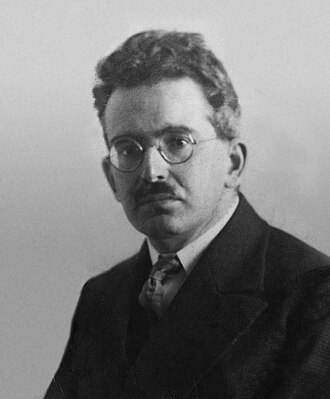Benjamin, Walter

Bio: (1892-1940) German philosopher, literary critic, cultural critic, and media theorist. Walter Benjamin studied at the universities of Berlin, Freiburg, Munich, and Bern. In 1925 his proposed habilitation thesis at the University of Frankfurt The Origin of German Tragic Drama was rejected because of its unconventional approach, leading to him never finishing his habilitation. Due to this Benjamin never held a formal academic post, although he collaborated with members of the Frankfurt School of critical theory, even though he wasn’t formally member of the Frankfurt Institute for Social Research. Benjamin was forced to move to Paris in 1933 due to the rise of Nationalist Socialism in Germany. After France suffered the defeat from Nazi Germany in World War II Benjamin tried to escape from France to Spain, but was rejected at the border, which lead to him committing suicide.
As well as other members of the Frankfurt School of critical theory, Benjamin sought to understand the complexities of modern society, culture, and economy, while his approach was influenced by historical Marxism and Jewish Kabbalistic mysticism. His writings, characterized by their eclecticism and depth, covered wide scope of topics - art, history, language, new media (photography and movies), technology, literature and its translations, drama, Romanticism, and the nature of culture.
One significant aspect of Benjamin's thought is his engagement with language and literature. He viewed language as a living entity, capable of revealing deeper truths about the world. His essay “On Language as Such and on the Language of Man” (1916) posits that language is not merely a tool for communication but a medium through which the world is understood and interpreted. This philosophical stance permeates his literary criticism, where he emphasizes the importance of close reading and the aesthetic experience of literature.
Benjamin, in the article “The Task of the Translator” (1923), explores the relationship between an original literary work and the afterlife that that work has when its translated into another language. For him translation is not merely transfer of the original information in another language, but the work of art that has to convey “the unfathomable, the mysterious, the ‘poetic,’ something that a translator can reproduce only if he is also a poet”. Once translated, the original literary work must die, to give it a new afterlife in translation.
One of Benjamin's most influential concepts is the “aura” of artwork, which he explores in his seminal essay “The Work of Art in the Age of Mechanical Reproduction” (1936). In this text, he argues that traditional works of art possess an aura, a unique presence that is tied to their authenticity and history. This aura is diminished in the age of mechanical reproduction, such as photography and film, which allows for mass production and distribution. Benjamin sees this shift as both liberating and problematic; while it democratizes access to art, it also alters the way we engage with it, stripping away the contemplative experience that comes from encountering a unique piece in its original context.
Benjamin’s interest in the intersection of art and technology is reflective of his broader philosophical inquiries. He was deeply concerned with the impacts of modernity on human experience and perception. His work often reflects a dialectical method, where he juxtaposes various ideas to reveal underlying tensions. This is particularly evident in his reflections on history and progress in the article “Theses on the Philosophy of History“ (1940), where he famously critiques the notion of linear historical development propagated by historical materialism. Instead, Benjamin envisions history as a constellation of moments, often punctuated by rupture and trauma, a perspective that aligns with his Jewish heritage and the tumultuous events of his time, including the rise of fascism in Europe.
Benjamin's work also intersects with political theory, particularly in his writings about the role of the intellectual in society. He believed that intellectuals should not merely critique society from a distance but engage actively in the political struggles of their time. His reflections on the nature of revolution and change are particularly poignant, as he suggests that true progress requires a radical rethinking of existing structures and ideologies.
Benjamin’s work has inspired a wide range of disciplines, from art history, historiography, philosophy, political theory to critical theory, and continues to provoke discussions about the relationship between technology, culture, and politics.
Fields of research
Art Christianity Communication History Language Media Modernity and Modernization Technology ViolenceTheoretical approaches
Critical Theory (Frankfurt School)Main works
“On Language as Such and on the Language of Man“ (1916);
“The Task of the Translator” (1921);
“Critique of Violence” (1921);
“Theologico-Political Fragment” (1921);
“Goethe's Elective Affinities“ (1922);
The Origin of German Tragic Drama (1928);
One Way Street (1928);
“Unpacking my library” (1931);
“The Rigorous Study of Art” (1932, translated into English in 1988);
“Doctrine of the Similar” (1933);
“On the Mimetic Faculty“ (1933);
“Franz Kafka: On the Tenth Anniversary of His Death” (1934);
“The Work of Art in the Age of its Technological Reproducibility” (1935–6);
“The Storyteller” (1936);
German People (1936);
“Eduard Fuchs, Collector and Historian” (1937);
Berlin Childhood around 1900 (1938);
“The Paris of the Second Empire in Baudelaire“ (1938);
“Paris, Capital of the 19th Century” (1935);
“Theses on the Philosophy of History“ (1940);
The Arcades Project (1982, translated into English 1999).

